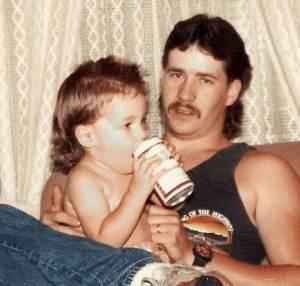
This kid has no chance.
In his most recent column, David Brooks tackles an uncomfortable idea: that many parents are simply not preparing their children for modern life. Brooks also ties this idea in with President Obama’s call for universal pre-k education.
Before we get into policy ideas I’m going to state the obvious: there are a whole lot of bad and apathetic parents. I do not intend that to necessarily be a moral judgement, but a statement of fact. Some are well meaning, but have let the complexity of modern life overwhelm them. Some, frankly, do not care about their children.
Because of poor parenting, many children never learn the skills necessary to thrive in society. Social skills, diversity of language and vernacular, critical thinking, cultural awareness, emotional control, the ability to delay pleasure for future gains, are, among many others, crucial skills necessary to navigate the modern world. Many children, through no fault of their own, never learn these at an early age, and immediately fall behind. Because they lack these skills in the first place, can never catch up. Later in life they go on to have children who are never taught these skills.
Enter early childhood education. There were many studies done on these programs which showed they can, in regards to these essential skills, partially make up for poor parenting. Other studies have shown large programs like Head Start have “no measurable advantage.” Brooks notes the up-and-down enthusiasm he’s felt towards early childhood education and it’s measurable affects. However, at the end of the day:
These programs do not perform miracles, but incremental improvements add up year by year and produce significantly better lives.
Enter President Obama. This week he announced the most ambitious early childhood education expansion in decades. Early Thursday morning, early education advocates were sending each other ecstatic e-mails. They were stunned by the scope of what Obama is proposing.
But, on this subject, it’s best to be hardheaded. So I spent Wednesday and Thursday talking with experts and administration officials, trying to be skeptical. Does the president’s plan merely expand the failing federal effort or does it focus on quality and reform? Is the president trying to organize a bloated centralized program or is he trying to be a catalyst for local experimentation?
So far the news is very good. Obama is trying to significantly increase the number of kids with access to early education. The White House will come up with a dedicated revenue stream that will fund early education projects without adding to the deficit. These federal dollars will be used to match state spending, giving states, many of whom want to move aggressively, further incentive to expand and create programs.
But Washington’s main role will be to measure outcomes, not determine the way states design their operations. Washington will insist that states establish good assessment tools. They will insist that pre-K efforts align with the K-12 system. But beyond that, states will have a lot of latitude.
The bottom line is that even though we still not entirely sure of the positive affects pre-k education has on people, there is enough evidence to suggest it may be the most ‘bang for your buck’ in education reform. In order to create the best pre-k education system possible, Brook’s emphases creating institutions that constantly review progress, and where change is the norm.
There’s still a lot we don’t know about how to educate children that young. The essential thing is to build systems that can measure progress, learn and adapt to local circumstances. Over time, many children will migrate from Head Start into state programs.
This is rude to say, but here’s what this is about: Millions of parents don’t have the means, the skill or, in some cases, the interest in building their children’s future. Early childhood education is about building structures so both parents and children learn practical life skills. It’s about getting kids from disorganized homes into rooms with kids from organized homes so good habits will rub off. It’s about instilling achievement values where they are absent.
